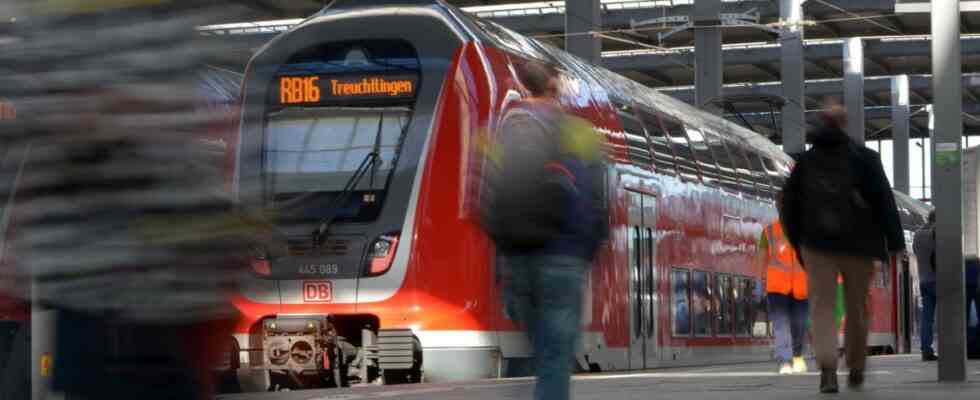The passengers who had to disembark in Freilassing on Monday, although they didn’t want to, can now tell their own story about the transport experiment nine-euro ticket. According to reports, the train of the Bavarian Regiobahn (BRB) started in Salzburg at 4:15 p.m., only to stop immediately afterwards as planned at the first station on the Bavarian side: There are still border controls in Freilassing, police officers then go through the train for passengers and their ID cards to consider. That leads to delays anyway. But because the regional train was so full that Monday that the officials could no longer get through, it was evacuated without further ado – which left many passengers on the platform until the next, later train.
Such incidents are probably the most visible indication that more people have been traveling on Bavaria’s tracks since June. However, opinions sometimes differ as to whether the nine-euro ticket is a success or not rather reveals the problems on the rails. When asked by SZ, Deutsche Bahn sees the ticket as “a clear signal that we in Germany are boldly tackling the mobility revolution in order to make an important contribution to climate protection”. Bavaria’s Transport Minister Christian Bernreiter (CSU), on the other hand, feels confirmed that the money “that is now being burned for the nine-euro ticket over the summer” is missing for the urgently needed expansion of public transport.
In fact, the nine-euro ticket is part of a much larger dispute: that of dear money. To put it simply, the federal states have been demanding more funds from the federal government for months in order to order and expand regional transport. In the end, how much money flows could also depend on the evaluation of the special ticket valid for June, July and August. Only: There are still hardly any figures on how this exactly fuels the number of passengers.
Even the Bavarian Ministry of Transport cannot name any for the Free State at the moment. However, the “long-distance RE lines in leisure and excursion traffic” are particularly busy, including the Munich – Hof and Nuremberg – Leipzig routes. Approximate values have been available for Germany for a short time. The Federal Statistical Office measured 42 percent more “movements in rail traffic” in June than in pre-Corona June 2019 using mobile phone data.
The number of delays has increased
How often trains are overcrowded is also difficult to say for Bavaria. According to Deutsche Bahn, the largest provider of regional transport, the nine-euro ticket provides around ten percent more passengers during the week. However, it is difficult to predict on which routes and connections there will be increased passenger numbers.
Nationwide, only 0.1 percent of all journeys had people getting off the train because of overcrowding. The Bavarian Ministry of Transport also reports of “sporadic overstaffing and isolated passengers and bicycles left behind”. Even before the nine-euro ticket, taking bikes was often a nuisance, so in some places bikes can only be taken outside of peak times. The DB recommends renting bikes at the excursion destination – and “not to take a bike on the train, especially at the weekend”.
The delays that rail travelers are complaining about more often can be summed up in more detail. According to the Ministry of Transport, the Bavarian-wide punctuality rate for June is 82 percent – which corresponds to a deterioration of seven percent compared to the previous month. One reason: “increasing stopping times” – i.e. delays in boarding and alighting due to high passenger numbers. However, many other causes have nothing to do with the nine-euro ticket. Among other things, the ministry notes “a noticeable increase in delays due to speed restrictions, for which the infrastructure operator DB Netz is responsible”. Slow-moving sections are usually set up where structural problems with the tracks and track bed have arisen.
Numerous restrictions and construction sites in the network are also currently being reported by the Go-Ahead railway company, which, among other things, serves the Munich – Lindau route. A spokeswoman said that higher passenger numbers and more delays are “big challenges in themselves”. But the combination of both makes it particularly stressful. “The infrastructure has been underfinanced for years, track systems and train stations have been severely dismantled. Now the capacity is not enough and the infrastructure is very unreliable in everyday life.”
The possibilities of simply attaching a trolley if required are also limited. Where larger vehicle capacities are possible, the DB and other companies usually already provide them – only the platforms are not always long enough for longer trains. The result: frustration again and again, which the staff sometimes gets. At Go-Ahead, for example, they are currently noting “an enormous burden” on the employees in contact with passengers. And the Ministry of Transport reports “increasing hostility towards train staff from passengers”. In some cases, the federal police were called in to persuade passengers to exit.

